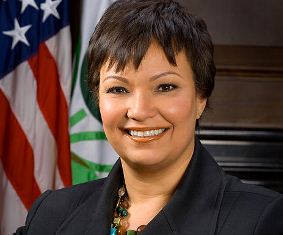
The EPA's Lisa P. Jackson connected pollution and |
By Jenée Desmond-Harris, The Root
On Sunday, Environmental Protection Agency Administrator Lisa P. Jackson delivered a sermon at Brown Chapel AME Church in Selma, Ala., to commemorate the 47th anniversary of Bloody Sunday. What do clean air and water have to do with issues that surrounded one of the most pivotal events of the civil rights movement? A lot, according to Jackson. The Root talked to her about the effects of environmental injustice on minority communities, the EPA's plan to make sure people of color aren't forgotten and why you don't have to love the great outdoors to care passionately about the ravages and real-life consequences of unchecked pollution.
The Root: Your sermon was delivered on the anniversary of Bloody Sunday, one of the most pivotal events of the civil rights movement. Explain how environmental justice is a civil rights issue.
Lisa P. Jackson: We talk all the time about the right to prosperity. The Declaration of Independence talks about life, liberty and the pursuit of happiness. We talk about prosperity and freedom to prosper. It's hard to envision true freedom in that regard if everyone doesn't have equal access to the basics of living -- and the basics of living include the right to breathe clean air, the right to drink water that's free from toxins and the right to build your home and community in a place that's free from environmentally ravaged land and the pollution and health impacts that come along with it.
It's not just about freedom from pollution -- pollution equals poor health. Poor air quality contributes to three of four of the leading causes of death among Americans. So when we talk about environmental justice, we're talking about Americans' basic rights to have equal access to being healthy.
TR: What are some of the real-life consequences for the people who are affected by this issue?
LPJ: An example is that, with respect to the issues of air quality, most African Americans in this country live in urban areas, whether we talk about Los Angeles, Houston or smaller, older cities that may have industrial sources around them. So, the administration just initiated standards for power plants and those standards are going to save 11,000 lives a year.
Also, when we talk about environmental justice, we talk about communities that may have been abandoned or forgotten or that at one time were the sites of abandoned factories. Just one contaminated plot in such a neighborhood can make it a place where businesses don't want to grow or invest. One dollar spent on cleanup in those communities means $19 in private-sector economic growth, because you remove that barrier to economic opportunity.
TR: The EPA has a plan to protect poor, minority and low-income communities from health and environmental risks. What are some of that plan's main components?
LPJ: EPA has a plan called Plan EJ 2014. Our goal, quite simply, is to make consideration of environmental justice and fairness part of EPA's everyday decision-making.
The plan includes legal tools -- looking at how and where environmental justice falls under existing statutes. It also addresses enforcement, because oftentimes communities of color say no one ever comes and looks to see if people are violating environmental laws there -- there's "midnight dumping," for example. They wake up and find contamination in the community.
I'd also like to give a shoutout to the administration's efforts. EPA has always had a special role with respect to environmental justice, but in this administration, President Obama has really revitalized the larger issue of environmental justice, in which other agencies as well as ours are playing important roles.
TR: You talked Sunday about your personal journey and about the accomplishments of this generation of African Americans. How did you become invested in the issue of environmental justice?
LPJ: The sermon tells my story growing up in New Orleans. The first thing I say about that is that you do not need to grow up with a love of the "great outdoors" to care about the environment. New Orleans is a wonderful, vibrant city but it is a city. So my love of the environment as an issue came from seeing the ravages of environmental pollution.
What happens to the Mississippi River if it's a dumping ground, and what does that mean for drinking water? What does it mean to have an area, that, when I was growing up, was called "Cancer Alley"? What does that mean for the health of my relatives and people who I knew who lived down there?
I came up caring about environmental issues from what we call the "brown side" -- stopping pollution. I'm an engineer by training and I wanted to use engineering to reverse-engineer pollution -- to think about cleaning it up and hopefully preventing it.
TR: Are you satisfied with the level of engagement among African Americans around the issue of environmental justice?
LPJ: African Americans still need to give greater attention to these issues. There are some great leaders in our community who realize that it's a quiet, pervasive message sent to a community when your community is always the site of a sewage treatment plan, or a rail line just passing through. When it's your community that gets the impacts and not the benefits.
We need to be vocal about this, about the fact that we have a right to clean air and clean water. It's a rights issue as important as the other ones. Also, if we're growing a green economy, we have the right and it's in our best interest to be part of that economy. That's where the jobs and opportunities will be.
Jenée Desmond-Harris is a contributing editor at The Root.




















































































































































































































































































































































